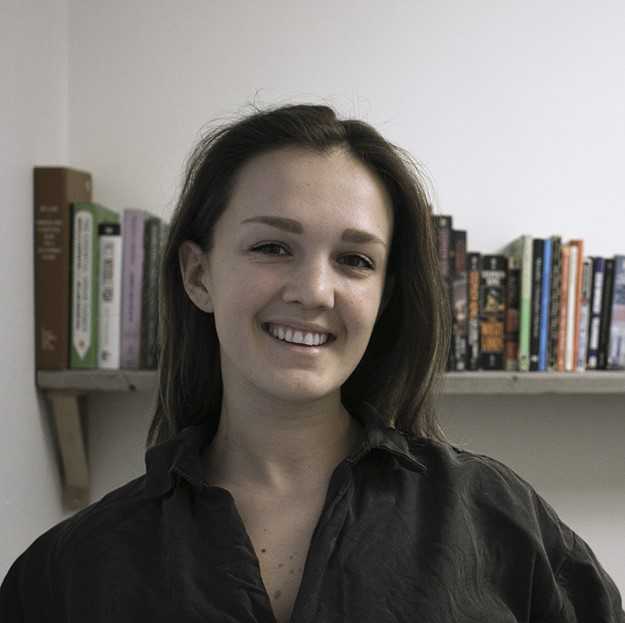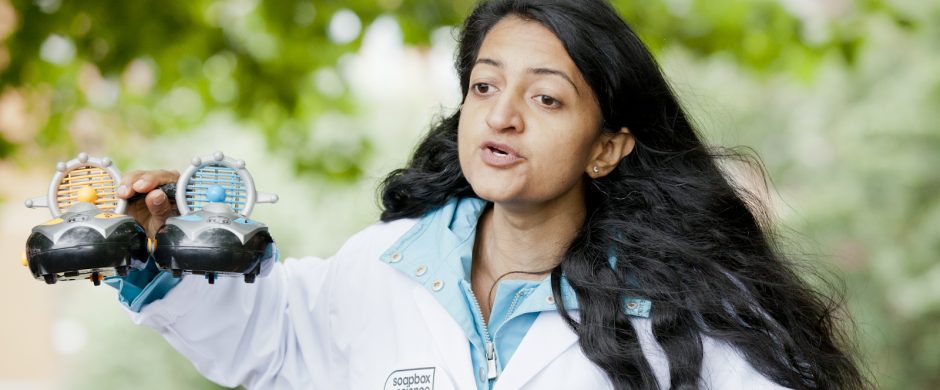 Hanna Haponenko (@HannaHaponenko), a PhD student in the Department of Psychology, Neuroscience, and Behaviour at McMaster University will be taking part in Soapbox Science Waterloo on June 9th with the talk “Seeing as a Cyclops”
Hanna Haponenko (@HannaHaponenko), a PhD student in the Department of Psychology, Neuroscience, and Behaviour at McMaster University will be taking part in Soapbox Science Waterloo on June 9th with the talk “Seeing as a Cyclops”
SS: What is your earliest memory of being excited by science?
In Grade 2, I managed a caterpillar’s metamorphosis into a cocoon into a butterfly. That was the first time I fell in love with science, and mainly in love with the mechanisms validating the ingredients required for carrying a species’ life cycle to term. That experience set the groundwork for how I saw science in later years—as a way to apply foundational principles to the growth of larger concepts and applications.
SS: What is the most fascinating or surprising aspect of your research/work?
I definitely feel like there are endless branches to my research, branches I’m constantly trying to swing to and from of the same tree. But the tree is like a phylogenetic tree, except that the species are my research interests and the relations among their evolutions are my work milestones, if that makes sense. I come from a medical background with a thesis in business, and now I’m in psychophysics, where I dabble in coding, statistics, and user experience design. But to label myself as one thing isn’t feasible for me. I guess what I’m trying to say is that the most fascinating thing about my work is its vastness in variability. I’m constantly swinging around, but always somehow staying where I need to be in the present, in that same tree.
SS: What is the funniest or most memorable thing that has happened to you while working in science?
A poignant memory was me finally realizing that my two-decade-long desire in becoming a medical doctor was all a mirage. I was working in biology for the better part of my academic life so far, and only recently accepted that it wasn’t my true calling. I had to laugh it off. My hypothesis didn’t hold up, and I took that in stride. I reckon that’s part of the whole science experience. Not everything I have set out for, am setting out for, and will set out for will ring true. And that’s funny to me, because there’s a lot of nervous emotion when things don’t pan out, but I just have to laugh within that chaos. Otherwise, where’s the fun in failure?
SS: What attracted you to Soapbox Science in the first place – and what are you most looking forward to in taking part?
I love the experience of catering my research to different age groups. Every age comes with its own level of understanding, biases, and skill level. Soapbox Science events are especially interesting because you have people of all ages listening to your content. The Soapbox Science Jr. event I was invited to speak at Toronto’s Harbourfront in early May was particularly challenging. Kids aged eight to twelve years of age were at this Harbourfront reading festival, all coming and going at different times. I had to gain the attention of many different brains, and in the process needed to busk and improv effectively. I love the allure of busking. I want to get better at that style of content delivery. It feels like I need part charisma, part knowledge, and part knowing-how-to-deal-with-my-own-panic.
SS: If you could change one thing about the scientific culture right now, what would it be?
I’d change the way concepts are communicated in scientific articles. A lot is published, but I’m constantly wondering how much of it is actually read by the general population. I think it should be on every researcher’s agenda to simplify their most complex research to be easily digested by the masses. Research can be complex, but it should never be complicated.
SS: What’s your science superhero power?
Being able to translate all research articles to an elementary reading level (i.e. reddit.com/r/ELI5).
SS: Do you have a few words to inspire other female scientists?
Don’t set yourself up for failure. Instead, embrace failure. Use it as fuel. Basically, know that stereotype threat exists, but don’t let fear of trying something new drag you down.
SS: What is a typical day like for you?
I lead a pretty flexible yet structured life right now. I wake up and read general articles for a half hour to an hour over breakfast. Then, I work on relevant research tasks. I could be coding, analyzing data, writing; I do all these things during my peak creative and focused energy levels, early in the day. After having a workout session in the gym and making dinner in the late afternoon, I usually spend the early to late evening reading and brainstorming. I try to mentally plan for the next day before bedtime. And any gaps I have in the day where I’m feeling unmotivated are filled with accomplishing some hobby goals – freelancing with web development, user experience and interface design, and photo editing.
SS: Do you have anything else you’d like to tell us about?
I’m constantly looking for new connections and experiences. Shoot me an email!
